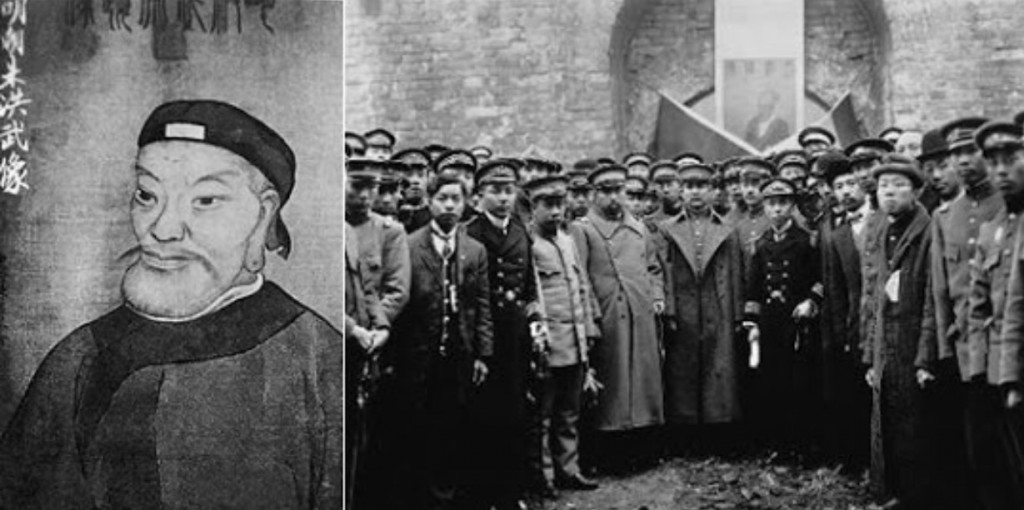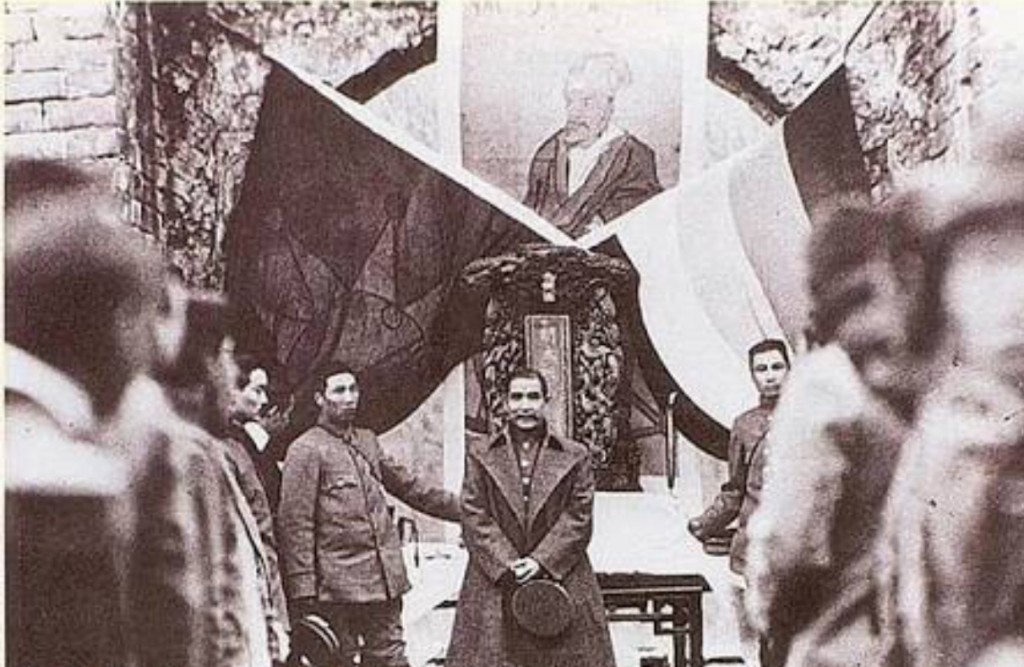
The historian Peter Zarrow has attempted to identify just when China’s dynastic history ended and its republican era began:
Symbolically, the Republic of China was founded several times. Self-chosen provincial representatives met in Nanjing and proclaimed the Republic on January 1, 1912. They wrote a provisional constitution and elected a provisional president, namely Sun Yat-sen. Having been away from China for so long, Sun was in effect a safe compromise choice while negotiations with Yuan [Shikai] continued. As Sun insisted, the delegates adopted the solar calendar, marked at Year One of the Republic. The southern revolutionaries, Yuan’s northern army, and the Qing court came to agreement in February on the ‘Articles of Favorable Treatment’ for the imperial house. This finally cleared the way for the Qing’s abdication. The Qing court’s formal abdication edict was issue on February 12. By this edict sovereignty (tongzhiquan) was transferred to the people and a republican constitutional form of government (gonghe lixian guoti) established. If anyone was paying attention, the Qing’s edict not only purported to establish a Republic, but rooted it in the Mandate of Heaven, as seen in the will of the people (renxin). It further claimed to be fulfilling the intention of the ‘ancient sages’ who thought the empire should be held in common (tianxia wei gong), and not incidentally conferred authority on Yuan Shikai to take the needed practical steps. A few days later, the Nanjing delegates elected Yuan to be the new provincial president, and he was sworn in on March 10… . October 10, 1911? January 1, 1912? February 12, 1912? March 10, 1912? When was the Republic of China founded? Did a revolutionary act create a new state de novo, a form of self-legitimating violence as the people through its representatives formed a new state? Or did the Qing create the new state through its generous abdication?[2]
In any case, as the authors of In Search of Old Nanking write, ‘on 15 February 1912, three days after the Manchu ruler abdicated, President Sun Yat-sen took part in a ceremony of sacrifice, obeisance and prayer at the tomb of Hongwu [founding emperor of the Ming dynasty, r.1368-1398]. As the Chinese people were still an ancestor-worshipping race, the prayer offered by Sun Yat-sen was a dramatic success. On 3 April 1912, The Times published a translation of the prayer. Here are some excerpts:
Of old, the Song dynasty became effete and the Liao Tartars and Yuan dynasty Mongols seized the occasion to throw this domain of China into confusion to the fierce indignation of gods and men. It was then Your Majesty, our founder, arose in your wrath from obscurity and destroyed those monsters of iniquity, so that the ancient glory was won again. In twelve years you consolidated the Imperial sway, and the dominions of the Great Yu were purged of pollution and cleansed of the noisome Tartar. Often in history has our noble Chinese race been enslaved by petty frontier barbarians from the North. Never have such glorious triumphs been won over them as Your Majesty achieved. But your descendants were degenerate and failed to carry on your glorious heritage … … 昔宋政不綱,遼元乘運,擾亂中夏,神人共憤。惟我太祖,奮起草野,攘除奸凶,光復舊物,十有二年,遂定大業,禹域清明,污滌羶絕。蓋中夏見制於邊境小夷數矣,其驅除光復之勳,未有能及太祖之偉碩者也。後世子孫不肖,不能敪厥武 … …
The Tartar savages were able to take advantage of the presence of rebels to invade and possess themselves of your sacred capital. From a bad eminence of glory basely won, they lorded it over this most holy soil, and our beloved China’s rivers and hills were defiled by their corrupting touch, while the people fell victims to the headman’s axe or the avenging sword … … 因緣盜亂,入據神京。憑肆淫威,宰割赤縣,山川被其瑕穢,人民供其刀俎。
Today it has at last restored the Government to the Chinese people and the five races of China may dwell together in peace and mutual trust. Let us joyfully give thanks. How could we have attained this measure of victory had not Your Majesty’s soul in heaven bestowed upon us your protecting influence? … … 北方既協,攜手歸來,虜廷震懼,莫知所為,奉茲大柄,還我漢人,皇漢民族,既壽永昌。嗚呼休哉!非我太祖在天之靈,
I have heard that in the past many would-be delivers of their country have ascended this lofty mound wherein is your sepulcher. It has served them as a hold inspiration. As they looked down upon the surrounding rivers and upwards to the hills, under an alien sway, they wept in the bitterness of their hearts, but today their sorrow is turned to joy. The spiritual influences of your grave at Nanking have come once more into their own. The dragon crouches in majesty as of old, and the tiger surveys his domain and his ancient capital. Everywhere a beautiful repose doth reign. Your legions line the approaches to the sepulcher; a noble host stands expectant. Your people have come here today to inform Your Majesty of the final victory. May this lofty shrine wherein you rest again fresh luster from today’s event and may your example inspire your descendants in the times which are to come. Spirit! Accept this offering!’ 又聞在昔救時之士,嘗躋斯丘,毷勵軍志,俯仰山川,唏噓流涕。昔之所悲,今也則樂。鬱鬱金陵,龍盤虎踞,宅是舊都,海宇無叱。有旆肅肅,有旅振振,我民來斯,言告厥成。喬木高城,後先有輝,長仰先型, 以式來昆。伏維尚饗。[3]

The full text of the introduction to the prayer offered by Sun Yat-sen that day at Xiaoling reads:
祭明太祖文
中華民國元年二月十五日辛酉,臨時總統孫文,謹昭告於明太祖開天行道,肇紀立即,大聖至神,仁文義武,俊德成功高皇帝之靈曰:
嗚呼!國家外患,振古有聞,趙宋末造,代於蒙古,神州陸沈,幾及拜年。我高皇帝應時崛起,廓清中土,日月重光,河山再造,光復大義,昭示來茲。不幸季室俶擾,國力罷疲。滿清乘間竊據中夏,嗟我邦人諸父兄弟,迭起迭僕,至於二百六十有八年。嗚呼!我高皇帝時怨時恫,亦二百六十有八年也。歲在辛亥八月,武漢軍興,建立民國。義聲所播,天下響應,越八十有七日,既光復十有七省,國民公議,立臨時政府於南京,文以薄德,被推為臨時總統。瞻顧西北,未盡昭蘇,負疚在躬,尚無以對我高皇帝在天之靈。邇者以全國軍人之同心,士大夫之正義,卒使清室翻然悔悟,於本月十二日宣告退位,從此中華民國完全統一,邦人諸友,享自由之幸福,永永無已,實維我高皇帝光復大義,有以牖啓後人,成茲鴻業。文與全國同胞,至於今日,始敢告無罪於我高皇帝,敬於文奉身引退之前,代表國民,貢其歡欣鼓舞之公意,惟我高皇帝實鑒臨之,敬告。
The text of the prayer itself (excerpted and translated in part above) is as follows:
謁明太祖陵文
維有明失祀二百六十有七年,民國始建。越四十有二日,清帝退位,共和鞏立,民國統一,永無僭亂。越三日,國民公僕,臨時大總統孫文,謹率國務卿士,文武將吏袛謁大明太祖高皇帝之陵而祝以文曰:
昔宋政不綱,遼元乘運,擾亂中夏,神人共憤。惟我太祖,奮起草野,攘除奸凶,光復舊物,十有二年,遂定大業,禹域清明,污滌羶絕。蓋中夏見制於邊境小夷數矣,其驅除光復之勳,未有能及太祖之偉碩者也。後世子孫不肖,不能敪厥武,委政小人,為猶不遠,卵翼東胡,坐茲強大,因緣盜亂,入據神京。憑肆淫威,宰割赤縣,山川被其瑕穢,人民供其刀俎。雖義士逸民跋涉嶺海,冀振冠裳之沈淪,續祚胤於一線,前僕後起,相繼不絕。而夭未悔禍,人謀無權, 徒使歷史編末添一傷心舊事而已。自時厥後,法令益嚴,罪罟益密。嗟我漢人,有重足傾耳,箍口結舌以保性命不給,而又假借名教,盜竊仁義,錮蔽天下,使無異志。帝制之計既周且備,將籍奸術,長保不義。然而張曾畫策於私室,林清焱起於京畿,張李倡教於川隴,洪楊發跡於金田:雖義旗不免終s蹶,亦足以見人心之所向矣。降及近世,真理昌明,民族民權,盎然人心。加以虜氛不竟,強敵四陵,不寶我土,富以其鄰。國人雖不肖,猶是神明之胄,豈能忍此終古,以忝先人之靈乎? 於是俊傑之士飆發雲起,東南厥始發難,吳樾震以一擊,徐錫麟注彈丸於滿酋之腹,熊成基舉烽燧於大江之涘,以及萍鄉之役,鎮南關之役,最近北京暗殺之役,羊城起義之役,屢起屢躓,再接再厲,天下為之昭蘇,虜廷為之色悸,藴釀蟬蛻,以成茲盛。武漢首義,天人合同,四方風向,海隅景從,遂定長江,淹有河淮。北方既協,攜手歸來,虜廷震懼,莫知所為,奉茲大柄,還我漢人,皇漢民族,既壽永昌。嗚呼休哉!非我太祖在天之靈,何以及此?昔嘗聞之,夷狄之運,不過百年, 滿清歷年,乃倍而三,非天無常,事會則然。共和之制,亞東首出,事兼創造,時異遲速。求仁得仁,焉用怨言。又聞在昔救時之士,嘗躋斯丘,毷勵軍志,俯仰山川,唏噓流涕。昔之所悲,今也則樂。鬱鬱金陵,龍盤虎踞,宅是舊都,海宇無叱。有旆肅肅,有旅振振,我民來斯,言告厥成。喬木高城,後先有輝,長仰先型, 以式來昆。伏維尚饗。
Notes
[1] On the subject of ‘ugly portraits’ of the Ming founder, see Dora C.Y. Ching, ‘Visual Images of Zhu Yuanzhang’, in Sarah Schneeswind, ed., Long Live the Emperor! Uses of the Ming Founder across Six Centuries of East Asian History, Minneapolis: Society for Ming Studies, 2008, pp.183-189 & 195-209.
[2] Peter Zarrow, After Empire The Conceptual Transformation of the Chinese State, 1885-1924, Stanford: Stanford University Press, 2012, p.213.
[3] Barry Till, with the assistance of Paula Stwart, In Search of Old Nanking, Hong Kong: Joint Publishing Co., 1982, pp.144-145. Excerpts from the Chinese original have been added.

